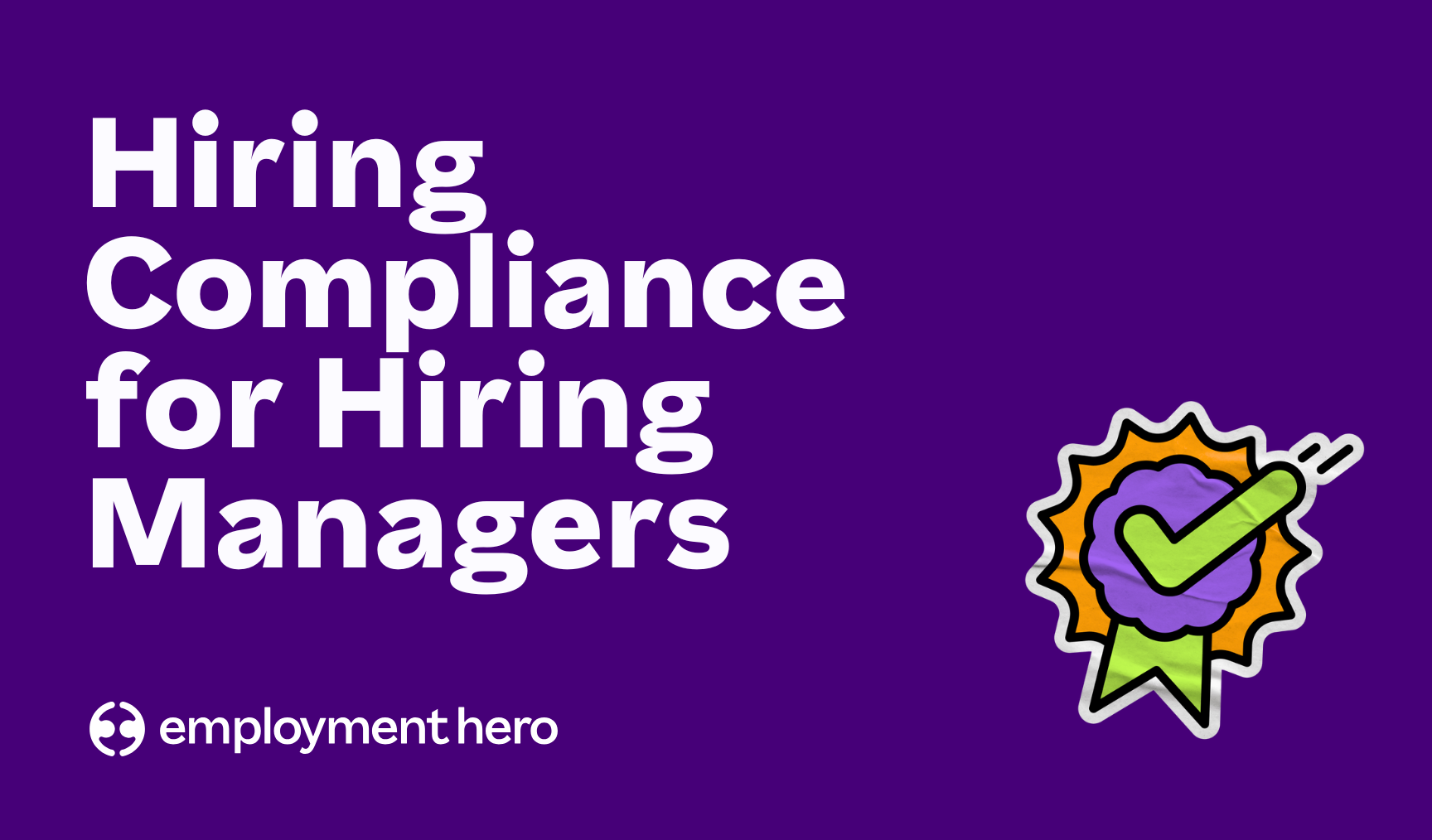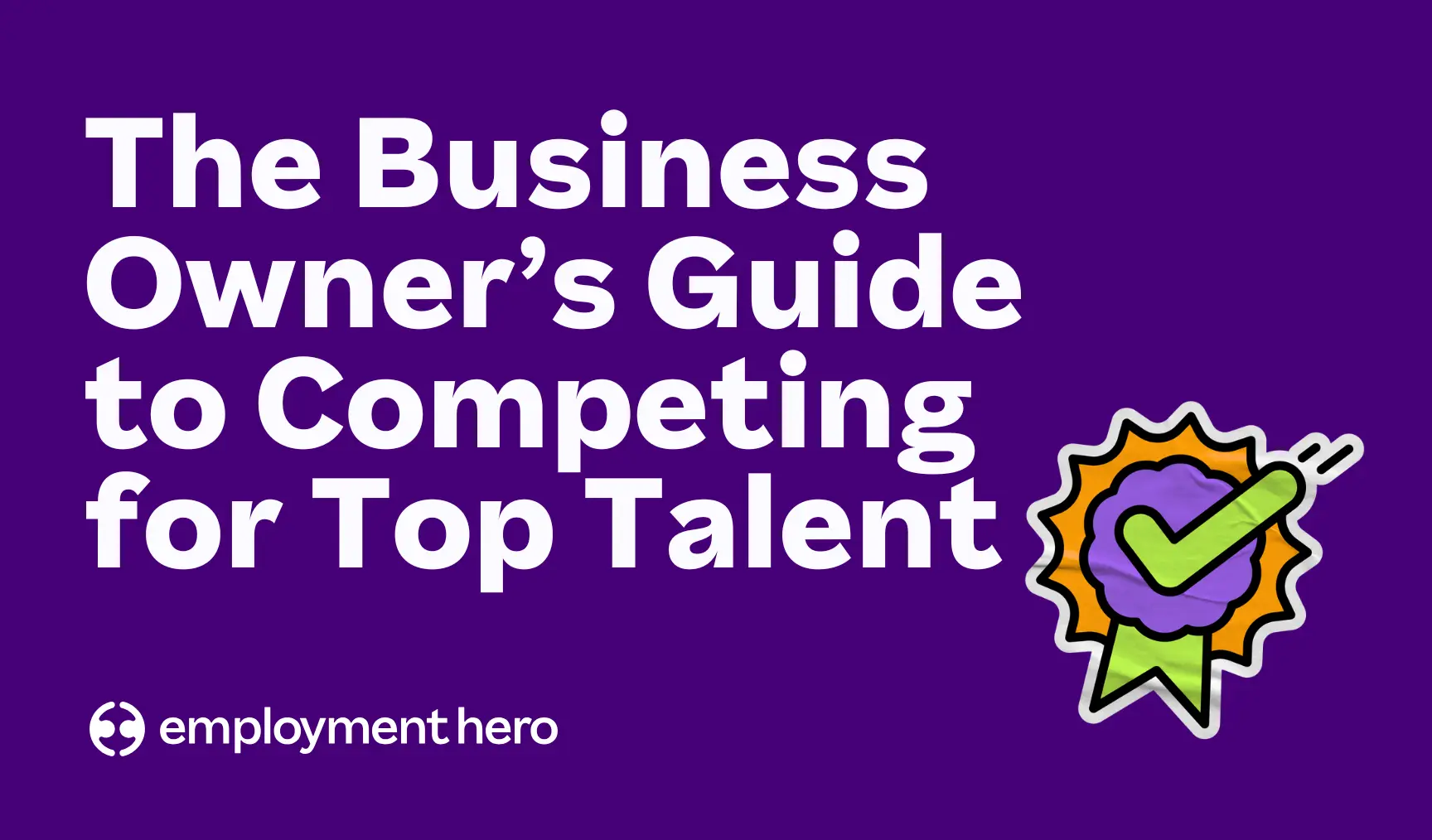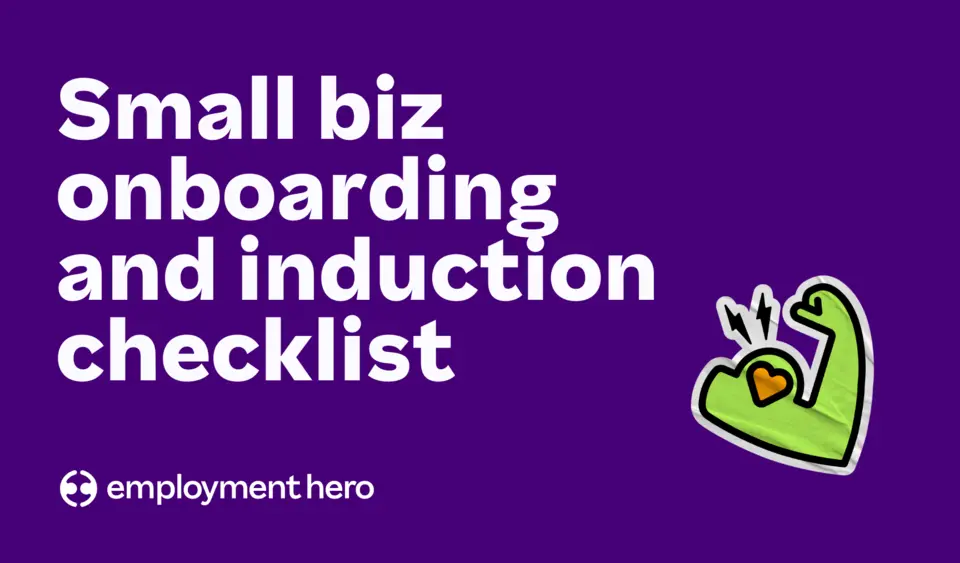Making an impact in your first 90 days as a new HR manager
Published
Making an impact in your first 90 days as a new HR manager
Published
2 min read
Starting any new role comes with a sense of high anticipation.
Not only do you want to make a good impression, you also probably want to make a splash. Making a positive impact in a new role can solidify a good reputation, open up new opportunities and set you up for success within a business.
But for best results, it has to happen within the first 90 days.
What’s in this new manager’s guide?
This guide covers the three key stages of success for new HR managers;
- Learning and absorbing to properly understand your company, your team, and their existing pain points
- Seeking solutions in new processes and technologies to solve HR issues within your business
- Managing change for long-term success in your new role
Disclaimer: The information in this article is current as at 30 November 2022, and has been prepared by Employment Hero Pty Ltd (ABN 11 160 047 709) and its related bodies corporate (Employment Hero). The views expressed in this article are general information only, are provided in good faith to assist employers and their employees, and should not be relied on as professional advice. The Information is based on data supplied by third parties. While such data is believed to be accurate, it has not been independently verified and no warranties are given that it is complete, accurate, up to date or fit for the purpose for which it is required. Employment Hero does not accept responsibility for any inaccuracy in such data and is not liable for any loss or damages arising either directly or indirectly as a result of reliance on, use of or inability to use any information provided in this article. You should undertake your own research and to seek professional advice before making any decisions or relying on the information in this article.

Who is this guide for?
This guide is for anyone entering a business as an HR professional. It will be especially helpful for those who are starting in a strategic role, but is also suitable for anyone looking to make their mark in a new HR role.
This guide is not industry-specific, and is broadly applicable to whatever kind of business you’re joining.
This guide will be less relevant for HR juniors, or someone who is an HR trainee. However, it never hurts to be ambitious! This guide might give you further insights into how an HR department works, and what HR leadership involves. You might just gain some nuggets of wisdom that you can apply through your career.
If you are someone who is just getting started in HR, we recommend downloading our free Intro to HR Management Guide. Inside this guide you’ll learn more about; the importance of HR in growing companies; the basics of recruitment, onboarding, policies, performance and more, and the digital tools that can help you easily get started. It’s a comprehensive introduction to this great profession.
Statistics about starting a new job in leadership
How hard is it really to succeed in a new role? According to the numbers, it’s all about time and consideration.
- A good impression is key for achieving early wins, and remember – every second counts! According to the NY Post, first impressions are made in as little as 27 seconds.
- The first 90 days are crucial. A 2016 study from Robert Half found that 63% of CFOs allow a new employee less than three months to prove themselves. Senior Director Paul McDonalad says that relationships can be make or break during this time; “Try to meet as many people across the organisation as quickly as possible. Understanding their roles and priorities will allow you to start adding value right away.”
- What managers do has a key impact on employee engagement, with Gallup estimating that managers account for at least 70% of variance in employee engagement scores across a business.
- According to Gartner, 45% of managers don’t feel confident in their ability to develop the skills that employees need today. Do you feel ready to serve your team with effective current knowledge?
- Research from Gallup suggests that only one in 10 people possess the talent to manage. “These 10%, when put in manager roles, naturally engage team members and customers, retain top performers, and sustain a culture of high productivity.”
- Your leadership journey as a new manager needs to be considered and strategic. According to research from Colombia University, estimates of incompetent leadership range from 30% to 67% of managers.
- It takes a lot to be a successful manager. Research featured in Fast Company shows that 60% of all new managers fail within the first 24 months of their new position. While the first 90 days might be the most crucial, your efforts need to be sustained for the long haul to truly succeed.

What are the characteristics of a successful HR director?
Whether you’re already an in house HR director or you’re just getting started with your HR career, it’s helpful to know – what do amazing HR leaders have in common?
HR leaders need to be organised and innovative, but most of all they need to be people people. That’s why they need these essential characteristics (as well as a great 90 day plan), to succeed.
Empathy
Empathy is a crucial part of being a leader. Being aware, understanding and sensitive of others’ feelings and experiences makes it possible to work and communicate effectively with a wide range of people in complex situations.
Knowing how to be empathic can help you improve communication with others and create great relationships, making for a positive workplace, especially in times of change.
Empathic leaders…
- don’t make assumptions
- take the time to listen without interrupting
- take a personal interest in their employees
- leave judgement out of conversations and;
- make an effort to see things from others’ perspectives.
Empathetic leadership is especially important when the going gets tough. Download our guide to empathetic leadership through an economic downturn to better understand how to use this skill under pressure.
Active listening
Whether you’re organising one on ones or informal discussions with a team, active listening is crucial to success for new managers (and existing ones!).
We recommend using the tool of ‘active listening’ to get the most out of your conversations and identify pain points. This communication strategy can help you better understand what the person is saying, and give a response to make the person feel understood and acknowledged (often leading them to share more helpful information).
Easy tips for better active listening include asking more questions than you think you need to and minimising distractions as much as possible. It’s also a great idea to take notes throughout the conversation and share these with the person at the end of your chat to make sure you have everything covered.
Organisational skills
Organisational skills are one of the most important skill sets to bring to an HR management position, yet they’re often forgotten amongst the more exciting leadership skills.
Whether you’re putting together an employee handbook, distributing and collecting employee surveys, organising onboarding paperwork or any of the other important responsibilities you have in HR – it’s essential to be able to keep track of moving parts.
Luckily, you don’t have to manage everything yourself! There are plenty of digital HR tools out there to help HR departments.
Tech literacy
One of the most common HR mistakes is continuing to engage with legacy manual processes, simply because “that’s the way it’s always been”.
Using HR technology can be game changing for an HR department, a company’s culture and overall business growth. Shaking off those time-consuming processes and streamlining your HR function can make your whole business more efficient, saving you money in the process. Learn more about how to choose the right HR software for your business.
Additionally, anyone in an HR director position should be a whiz at social media, especially LinkedIn. The platform provides a great opportunity for networking, recruiting and building your personal brand in HR. Read our tips for getting the most out of LinkedIn as an HR professional.
Curiosity
Just like your employees and your company, HR is always evolving.
For your first three months and beyond, we think that it’s incredibly important to keep a growth mindset and always continue to learn. There will always be new skills and new technologies to discover which could make you a more dynamic professional.
Some of the best ways to keep your brain expanding in HR include;
- Keeping up-to-date with the latest news and insights, from great publications like the Harvard Business Review, Forbes, and our very own Employment Hero blog, where we unpack the latest news as it applies to SME business owners and HR leaders
- Have regular conversations with people inside and outside your organisation. Strong relationships internally with people on all levels will help guide your work, and frequent conversations with HR directors and leaders in your network will help you stay on the pulse of the industry
- Be open to trialling new ideas, whether they relate to a workplace wellbeing trend, a new piece of technology, a new way to communicate or a new meeting cadence – you never know which idea might be a gamechanger for your company
- Always keep your eyes open for new HR trends – which generally pop up around once a year – and think about how you could apply them to your business

Tips for building trust as a new HR team member
Meaningful impact is never made straight away – first you need to learn and absorb from those around you. This builds knowledge but, more importantly, it builds trust.
That’s why the learning and absorbing part of our guide is so important for new managers.
Taking the time to properly understand the environment you’re working in will be invaluable when it comes to making changes. The last thing you want to do is start moving things around before you know the lay of the land – that’s an easy way to make mistakes and worse, frustrate stakeholders.
Download our guide for a full list of steps and tips, including information on how to;
- Understand as much as possible about the product/service and its clients
- Understand the company’s values and growth journey
- Understand the business’ HR function
- Identify key internal stakeholders
- Set up regular meetings
- Get involved in company culture and always ask questions
How to create sustainable change in a new company
Part three of our guide, ‘Managing change for long-term success in your new role’, talks about how to make your changes stick.
This goes long beyond your first three months as a new manager, but is worth thinking about from the outset. In part three we cover the essentials for long-term change, including communications, ongoing training, creating team advocates and the power of feedback.
All of these elements should be brought together in a long-term HR strategy which can set a blueprint for many years ahead. Learn more about what makes a great HR strategy here.
Not in HR but curious about how you can make a long-term change in a senior management position? You need to learn more about change management.
Many leaders make the mistake of implementing change then just leaving their teams to adopt the new initiatives for the long term; which can be a recipe for disaster. Instead, every manager should be well versed in the principles of change management.
Forbes defines change management as “a structured process for planning and implementing new ways of operating within an organisation”. The purpose of change management is to put in place clear processes and strategies to execute the change successfully while also supporting those impacted to adapt to the change.
Want to learn more about change management? Our easy-to-read guide can help you apply these skills in whatever role you’re in. Download the free guide now.

More tools for success in a HR leadership position
Are you beyond your first 90 days as an HR director or professional? How can you seamlessly transition from ‘new manager’ to a company mainstay?
Here are some more resources that HR managers love;
-
- Download: HR Audit Checklist
- Download: 11 Reasons to Switch to SaaS HR
Learn how to make a lasting impact in the first 90 days
Are you ready to learn how to make a big impact in your new role? Download our guide at the form on the right.
The smarter way to manage HR, people, payroll and productivity. For small and medium businesses on the up.
Related Resources
-
 Read more: Recruitment compliance do’s and don’ts: Hiring compliance for hiring managers
Read more: Recruitment compliance do’s and don’ts: Hiring compliance for hiring managersRecruitment compliance do’s and don’ts: Hiring compliance for hiring managers
Published 1 min read Having responsibility for a business’s approach to hiring can be daunting: how do you ensure all…
-
 Read more: Hiring Issues Holding You Back? The Business Owner’s Guide to Competing for Top Talent
Read more: Hiring Issues Holding You Back? The Business Owner’s Guide to Competing for Top TalentHiring Issues Holding You Back? The Business Owner’s Guide to Competing for Top Talent
Published 1 min read Hiring great people is one of the most powerful ways to grow your business – but…
-
 Read more: Dodge Thousands in Fines, Keep Great Staff: Onboarding Checklist
Read more: Dodge Thousands in Fines, Keep Great Staff: Onboarding ChecklistDodge Thousands in Fines, Keep Great Staff: Onboarding Checklist
If you run a business with under 10 staff, this onboarding checklist will help you get the most out of…










